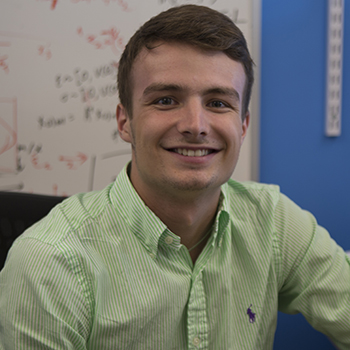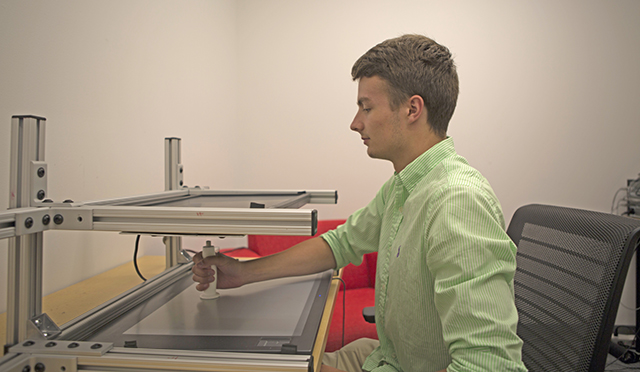 NAME: Caleb Ringkob
NAME: Caleb Ringkob
CONCENTRATION: Bioengineering
RESEARCH FOCUS: Motor control
RESEARCH LAB: Neuromotor Control Lab
ADVISOR: Maurice Smith, Gordon McKay Professor of Bioengineering
What have you been researching this summer?
Remarkably, our motor systems forget actions nearly as quickly as they learn them. I’m researching how different types of learning affect how well a certain action is retained. In order to study this, we can look at one of the simplest movements possible: a reaching movement. My research focuses on three different learning mechanisms: error-based learning, which always gives the subject visual feedback, reinforcement learning, which doesn’t give the subject visual feedback, and error-based learning with delays in between trials. By studying the learning decay rates resulting from each method, we will be provided insight as to how different types of learning, specifically the spacing effect, impact learning retention.
What are some of the practical applications of this research?
Motor control and neuroscience, in general, are two areas that still have many unanswered questions. By studying motor control we can figure out better ways to learn certain actions that can be applied to athletic activities or physical therapy for neurological disorders such as Parkinson's or cerebral palsy. Additionally, examining the nature of the human nervous system has broad applications to machine learning and AI.
Why did you decide to pursue this area of research?
My dad passed away from ALS when I was in high school, so that is the main factor that drives me to pursue research in motor control. Also, my interest in athletics and fitness has made me more passionate about learning how our bodies can accomplish such complicated tasks, such as shooting a three-pointer in basketball.
How did you get involved with this research lab?
I’ve taken three classes that were taught by Prof. Maurice Smith, and I really enjoyed him as a professor so I reached out to him. I knew I wanted to do some sort of engineering research that would incorporate my classes and my interest in the nervous system. I really enjoyed his teaching style, so looked up his lab and his papers, and they were all really interesting.

What are some of the biggest challenges of conducting this research?
I did research last summer, but it was in a much more supervised setting. I participated in a very structured Research Experiences for Undergraduates program, so I didn't necessarily have much freedom with my research. This summer, I have a lot more independence, but that also comes with its own challenges because I’m forced to fix many issues on my own and take my own initiative. I overcome these challenges with the help I receive from my mentors.
What do you enjoy about the research?
I really enjoy how much computer science and data analysis is involved in this research, as these skills have broad applications in many fields. By taking on my own project, I’ve gotten to experience a large scope of research, from experimental design through analyzing results. One of the exciting things about motor control and nervous system research is how little we know about it. It brings about some difficulties and it’s very challenging, but at the same time it's fascinating because in this lab we can be figuring out things that people haven't discovered yet.
Why has conducting research in a Harvard lab been a rewarding or beneficial experience for you?
Conducting research has allowed me to take what I’ve learned in class and apply it in a more practical setting. Researching this summer has also furthered my interest in pursuing medicine or biotech down the line. I’ve really enjoyed getting closer to the professors through the research. The faculty members here at Harvard are amazing, and I have a lot to learn from them.
What are your plans for after graduation?
I’ve explored many different areas of biomedical engineering, so I plan to either pursue medical school or medical device design after college. No matter where I go, I want to make an impact on the medical field in some aspect whether that's by designing a new device or through patient care interactions.